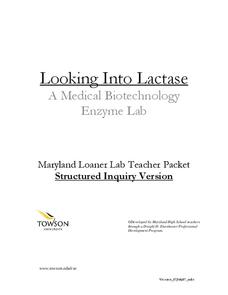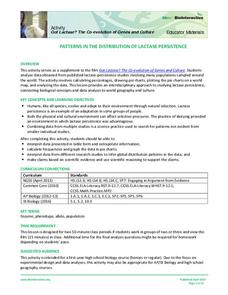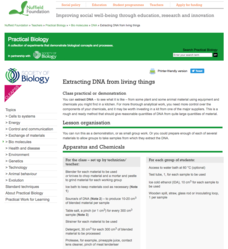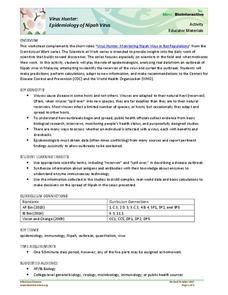American Physiological Society
Effects of Environment on Enzymes
Much like the tale of Humpty Dumpty, proteins, once altered, will never be the same again. Honors and pre-AP biology classes explore the delicate world of enzymes via a Webquest and lab experiment. The teacher's guide contains all...
Nuffield Foundation
Enzyme-Catalysed Synthesis
Enzymes: not just for breaking chemicals apart. Young biologists perform an experiment on potatoes. They first remove starch from potato extract. They then add the resulting liquid to samples of glucose-1-phosphate, glucose, maltose, and...
K20 LEARN
Speedy Cat: Enzymes
Enzymes have a need for speed! What happens when they are forced to slow down? A well-rounded lesson plan from the K20 Center examines enzyme activity through role playing and a lab. Biology scholars work in teams and pairs to understand...
Nuffield Foundation
Investigating Enzymes Used in Laundry Detergent
It's a win-win situation: learn about enzymes and get clean clothes, too. Young scientists add enzymes to a dilution of laundry detergent. They apply them to stained fabrics to determine the effectiveness of the enzyme-filled detergents.
Nuffield Foundation
Working with Immobilized Enzymes or Microscopic Organisms
Let the lab be a catalyst to learn about enzymes. Scholars create alginate beads filled with yeast. As part of an investigation into enzymes, they see how these beads provide a catalyst to the reaction of glucose into ethanol.
Nuffield Foundation
Microbes Ate My Homework
Now you have a new excuse not to do your homework. A long-term experiment has learners explore cellulose-digesting enzymes. They simulate how paper breaks down in a compost bin. There's no need to blame your dog for eating your homework...
Towson University
Looking Into Lactase: Structured Inquiry
Why is lactase important? Biology scholars explore enzyme function in a structured inquiry lab. The activity tasks lab groups with observing how temperature and pH affect enzyme activity, as well as determining which milk products...
Howard Hughes Medical Institute
Patterns in the Distribution of Lactase Persistence
We all drink milk as babies, so why can't we all drink it as adults? Examine the trend in lactase production on the world-wide scale as science scholars analyze and interpret data. Groups create pie charts from the data, place them on a...
Howard Hughes Medical Institute
The Making of the Fittest: Got Lactase? The Co-evolution of Genes and Culture
Got milk? Only two cultures have had it long enough to develop the tolerance of lactose as an adult. Learn how the responsible genes evolved along with the cultures that have been consuming milk. This rich film is supplied with a few...
Howard Hughes Medical Institute
Got Lactase? The Co-Evolution of Genes and Culture
Does the human body evolve as quickly as human culture? With a stellar 15-minute video, explore the trait of lactose intolerance. Only about 1/3 of human adults seem to still have the enzyme lactase and therefore, the ability to digest...
Towson University
Case of the Crown Jewels
Can your biology class crack the Case of the Crown Jewels? Junior forensics experts try their hands at DNA restriction analysis in an exciting lab activity. The activity introduces the concept of restriction analysis, teaches pipetting...
Nuffield Foundation
Extracting DNA from Living Things
Help! Someone's trying to take my DNA! An interesting lab experiment has scholars use basic materials to extract DNA. By applying ethanol, cold water, and a protease enzyme, like pineapple juice, they pull strands of DNA from peas,...
Howard Hughes Medical Institute
Virus Hunters: Epidemiology of Nipah Virus
Who actually goes looking for a virus? Expose your class to the high-stakes life of an epidemiologist on the trail of the Nipah virus. Pupils engage in a short video, then examine how scientists predict, model, and find the source of...
Kenan Fellows
Unit 1: Introduction to Biotechnology
Biotechnology is big! Introduce the uses of biotechnology to science scholars with a fascinating, fact-filled unit. The first installment in a series of four biotechnology units covers the role biotechnology plays in human and...
Kenan Fellows
Unit 2: DNA Analysis
Ever wonder how they solve those mysterious murders in TV crime dramas? The second of four units in a Biotechnology series introduces scholars to the many methods of DNA analysis. Pupils create and run their own gel electrophoresis...
Howard Hughes Medical Institute
Central Dogma and Genetic Medicine
Scientists work every day to find solutions to genetic diseases. Scholars learn about the process of gene sequencing, mutations, and the results. They explore genetic diseases and therapies to intervene and help and, through case...
Howard Hughes Medical Institute
Viral DNA Integration
How do reverse transcriptase inhibitors work? Young virologists examine the function of azidothymidine, a drug doctors use to treat HIV patients, during a hands-on modeling activity. Groups create a strand of DNA from an HIV RNA strand...


















